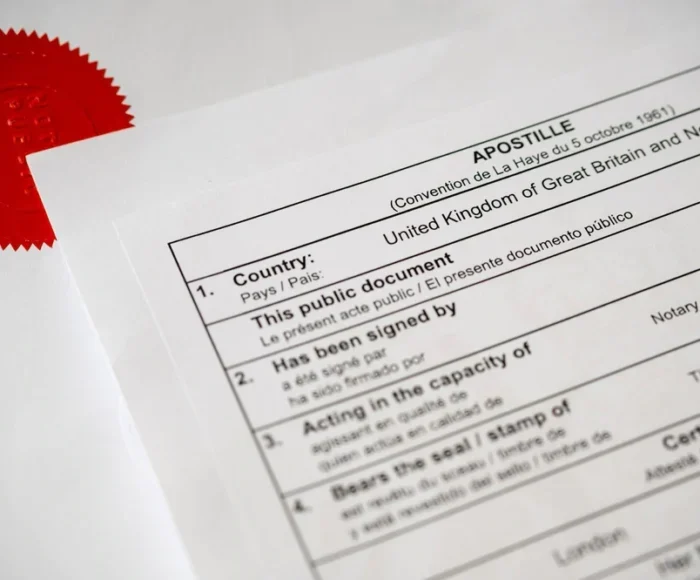In order to secure an Apostille in Turkey, the document requiring authentication must first be translated into Turkish and notarized. This document, along with a photocopy of the applicant’s passport or identification card, should then be presented to the governor’s office. The Apostille certificate will be issued by the governor’s office and affixed to the original document. Contrary to the practice in many other Hague Convention member countries, there is neither a delay nor a fee associated with obtaining an Apostille in Turkey. The service is entirely free, and the Apostille is issued concurrently with the submission of the documents.
In this article, we shall discuss only Apostille and the difference between notary and certification. If you are looking for any further information regarding any other legalization of official documents you can review our following article: Legalization Of Foreign Documents In Turkey
Table of Contents
ToggleWhat is Apostille?
Apostille is a certification that authenticates the seals and signatures of officials on public documents such as birth certificates, court orders, or any other document issued by a federal agency or certified by a member country of Hague Convention. It certifies the document(s), so the document can be recognized in foreign countries that are members of the 1961 Hague Convention Treaty. The importance of understanding the Apostille lies in the fact that without proper authentication, the foreign court or other governmental body might not accept the documents as properly authenticated.
What types of documents require Authentication with Apostille?
An apostille is a certification that authenticates the seals and signatures of officials on public documents such as birth certificates, court orders, or any other document issued by a state. The following types of documents typically require an apostille:
- Articles of incorporation or organization
- Certificates of limited partnership
- Certificates of merger
- Assumed name certificates
- Registration of trademarks
- Vital records issued by a state
- Federal/state documents
It is important to note that the country in which the document will be used determines the type of certificate needed. If the country where the document will be used is a member of the 1961 Hague Convention Treaty, an apostille is required. If the country is not a member of the treaty, an authentication certificate may be required instead.
FAQ: The difference between apostille and notarization
The main differences between the two are:
Apostille:
- A certificate that authenticates a document to be used in proceedings in a foreign country.
- Guarantees the authenticity of a document signature and any notarial stamps/seals affixed to the document.
- Attached to the original document they are certifying and ensure that the certification is recognized in foreign countries that are members of the 1961 Hague Convention Treaty.
- Used for documents such as articles of incorporation, certificates of limited partnership, certificates of merger, assumed name certificates, registration of trademarks, vital records issued by a state, and federal/state documents.
Notarization:
- The act of a notary public verifying the legal validity of a document’s signatures.
- Used only within the country where it has been notarized.
- The notary public verifies the identities of everyone signing the document and also witnesses the signing.
- Documents that are notarized are usually used in the notarized country.
In summary, an apostille is a certificate that authenticates a document to be used in proceedings in a foreign country, while notarization is the act of a notary public verifying the legal validity of a document’s signatures and is used only within the same country.
FAQ: The difference between apostille and certification
The main differences between the two are:
Apostille:
- A certificate that authenticates a document to be used in proceedings in a foreign country.
- Used by countries participating in the Hague Convention.
- Attached to the original document they are certifying and ensure that the certification is recognized in foreign countries that are members of the 1961 Hague Convention Treaty.
- Used for documents such as articles of incorporation, certificates of limited partnership, certificates of merger, assumed name certificates, registration of trademarks, vital records issued by a state, and federal/state documents.
Certification:
- A certificate that authenticates a document to be used in proceedings in a foreign country.
- Used by countries that do not participate in the Hague Convention.
- Does not need to be attached to the original document they are certifying.
- Used for documents such as articles of incorporation, certificates of limited partnership, certificates of merger, assumed name certificates, registration of trademarks, vital records issued by a state, and federal/state documents.
In summary, both apostille and certification are certificates that authenticate a document to be used in proceedings in a foreign country. The main difference is that apostilles are used by countries participating in the Hague Convention and are attached to the original document, while certifications are used by countries that do not participate in the Hague Convention and do not need to be attached to the original document.
FAQ:Which countries are the members of the Apostille Treaty?
The Hague Convention on Apostille is an international treaty that simplifies the process of authenticating documents for use in foreign countries. The following countries are members of the Hague Convention:
| Country | Country | Country | Country | Country | Country | Country |
| Albania | Andorra | Antigua and Barbuda | Argentina | Armenia | Australia | Austria |
| Azerbaijan | Bahamas | Bahrain | Barbados | Belarus | Belgium | Belize |
| Bolivia | Bosnia and Herzegovina | Botswana | Brazil | Brunei Darussalam | Bulgaria | Burundi |
| Cabo Verde | Chile | China (Hong Kong and Macao only) | Colombia | Cook Islands | Costa Rica | Croatia |
| Cyprus | Czech Republic | Denmark | Dominica | Dominican Republic | Ecuador | El Salvador |
| Estonia | Eswatini | Fiji | Finland | France | Georgia | Germany |
| Greece | Grenada | Guatemala | Guyana | Honduras | Hungary | Iceland |
| India | Indonesia | Ireland | Israel | Italy | Jamaica | Japan |
| Kazakhstan | Kosovo | Kyrgyzstan | Latvia | Lesotho | Liberia | Liechtenstein |
| Lithuania | Luxembourg | Macau | Malawi | Malta | Marshall Islands | Mauritius |
| Mexico | Moldova | Monaco | Mongolia | Montenegro | Morocco | Namibia |
| Netherlands | New Zealand | Nicaragua | Niue | North Macedonia | Norway | Oman |
| Panama | Paraguay | Peru | Philippines | Poland | Portugal | Romania |
| Russia | Saint Kitts and Nevis | Saint Lucia | Saint Vincent and the Grenadines | Samoa | San Marino | Sao Tome and Principe |
| Serbia | Seychelles | Singapore | Slovakia | Slovenia | South Africa | South Korea |
| Spain | Sri Lanka | Suriname | Sweden | Switzerland | Tajikistan | Thailand |
| Tonga | Trinidad and Tobago | Tunisia | Turkey | Ukraine | United Kingdom | United States of America |
| Uruguay | Uzbekistan | Vanuatu | Vatican City | Venezuela | Vietnam | Zambia |
It is important to note that the list of countries participating in the Hague Convention may change over time. You can check the changes from the official website of Hague.
Apostille in Turkey
To obtain an Apostille in Turkey, the original document that needs to be authenticated must be translated into Turkish, notarized, and taken to the governor’s office along with a copy of the requester’s passport or ID card. The governor’s office will issue the Apostille certificate and attach it to the original document. Unlike most of the other members of the Hague Convention, there is no delay or fee whilst obtaining Apostille in Turkey. Apostille is completely free of charge in Turkey and the issuing authority provides the apostille within the same time as the documents submitted.
Common mistakes to avoid while applying for apostille in Turkey
When applying for an apostille in Turkey, there are several common mistakes that should be avoided to ensure a smooth and successful process. Here are some of the most common mistakes to avoid:
- Not understanding the requirements: It is important to understand the requirements for obtaining an apostille in Turkey. This includes knowing which documents require an apostille, the fees involved, and the time frame for processing.
- Sending the wrong documents: Sending the wrong documents or sending documents to the wrong governmental office can result in delays or rejection of the application.
- Not providing a notarized Turkish translation: All documents that require an apostille in Turkey must be accompanied by a notarized Turkish translation. Failure to provide this can result in rejection of the application.
- Not paying the correct fees: The fees for obtaining an apostille may vary depending on the type of document and the issuing authority. Not paying the correct fees can result in delays or rejection of the application.
- Not following up on the application: It is important to follow up on the application to ensure that it is processed in a timely manner. Failure to do so can result in delays or rejection of the application.
In summary, when applying for an apostille, it is important to understand the requirements, send the correct documents to the correct governmental office, provide a notarized Turkish translation and follow up on the application. By avoiding these common mistakes, the process of obtaining an apostille in Turkey can be smooth and successful.





